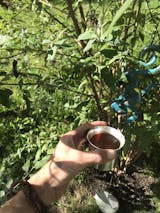2010 Bulang Bamboo Sheng Pu Erh
The tea leaves of this 2010 Bulang Sheng Pu Erh were from both big trees and ancient trees in Banpen village in Bulang Mountain. It was a mixture, because 9-10 years ago, the concept of big tree (Dashu) and ancient tree (Gushu) were not very important, but it was then still very important that good Pu Erh teas were made from tea trees but not newly planted tea bushes. Our 2010 Bulang Sheng Pu Erh contains not a single leaf from tea bushes.
The tea was pressed into bamboo sticks instead of being pressed into cakes by stones, that’s why the shape of this tea is in columns. Before we shipped this tea to Europe, we decided to remove the bamboo and rewrapped the tea into bamboo shells, because this way the tea weighs less and saves us shipping fee.
This Sheng Pu Erh tea was aged in Kunming for 9,5 years before shipped to Germany. Now let’s get down to its aroma and taste.
First and foremost, I need to point out that this 2010 Bulang Sheng Pu Erh does not taste like bamboo, though it was hard-pressed into bamboo and on the surface of the tea column there are also little white bits from the inside of a bamboo. But the bamboo taste is magically absent.
Aroma:
8g of the dry tea leaves in my 100ml Yixing teapot smell sweet and fruity, reminding me of the dried kernel of a plum or apricot. Imagine that you finish eating a few apricots, leave the kernels in a bowl and forget to throw them away. When you come back, the apricot kernels are completely dried. The sweet aroma the dried kernels give out is very similar to what you get from the dry leaves of this 2010 Bulang Sheng Pu. But the tea leaves smell much stronger than the dried kernels.
The rinsed wet leaves smell like burned jam or smoky jam. The sweet jam part is strong and the toasty or smoky part is subtle.
Taste:
First infusion: I recommend 95-100 degree water, 8 g in a 100ml Gaiwan or pot, leave it 10 seconds brewing for the first infusion.
The first infusion is a bit watery with slight fruity sweetness, which is felt more in the aftertaste. It’s like the tea just woke up from sleeping, still lazy and weak.
Second infusion: I recommend maximum 5 seconds. The tea becomes more potent, it’s like the tea is now fully awake and ready to make an impression. It has a tiny bit of vegetal bitterness, impressive sweetness which is now like from a fresh sugar cane but not dried Apricot kernels anymore.
It’s extremely fruity and sweet in the aftertaste, also a little dry and astringent. After a few minutes, you can detect a bit of Jasmin-like floweriness in the mouth but in a very subtle way. If you are busy with other things, you might miss the floweriness, but you cannot miss the sweetness.
Third infusion: I recommend 2-3 seconds only. This infusion when brewed very short has more of the jasmine-like floweriness than previous infusions and a little less fruitiness, but extreme sweetness and the slight bitterness endure. The sweetness and jasmine floweriness last in the aftertaste.
Sheng Pu Erh Tea from other mountain may become less complex after 6-8 infusions, bitterness gone, astringency gone, what stays is almost only fruity sweetness in a very clear and pure way. However, good Sheng Pu Erh tea from Bulang mountain keep the sweetness, the slight bitterness, astringency and tea energy up to 10 infusions. The bitterness and astringency turn into sweet aftertaste and lasts for a long time. Bulang tea is no weak tea!!!
Texture
The texture of the tea is watery in the first infusion, and medium or medium thin in the middle infusions. Then it starts to thin out slowly from the 6th infusion.
Tea energy
When I tried this 9-year-old Bulang for the first time, I was tea drunk after 2 infusions. I was nicely tipsy but not shaky or rushy. It was a cloudy and humid day. I don’t know if it has to do with the weather.
When I tried the second time on a sunny and humid day, I didn’t get so tipsy like last time. I felt calm and happy, but I don’t think that I was tea drunk at all.
So the tea energy is there, but how you feel it depends on you and the environment.
Lastly, if I can put it in one sentence, I think the advantages of this tea are the slight bitterness combined with strong sweetness in the taste, long-lasting sweetness in its aftertaste and its energy (Chaqi); the disadvantage is that it’s quite dry in the first few infusions.
I think the brewing time for this tea is very important. If you take 8g for 100ml water, brew it rather too short than too long. But in the end, taste is a very personal thing, please try it out by yourself for the optimal taste and sensation for you.












